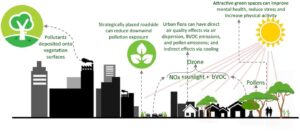Understanding air pollution in a warming world
The aim of this project is to determine what impact higher average temperatures and extreme temperature events will have on concentrations of volatile organic compounds in cities and how these might lead to future changes in UK urban air quality through increased ozone and particulate matter formation.
Anthropogenic climate change is driving significant changes in the UK climate, such as wetter and warmer winters and hotter and drier summers. The last two years have been the UKs warmest on record, with the mean temperature in 2022 around +1.1 °C above the 1990-2020 average as shown on the right hand side of figure 1. Studies have also suggested an increase in frequency of extreme temperatures and that under high emission scenarios, heat waves above 40 °C are predicted to occur every 3-4 years in the UK by 2100. Therefore, it is vital to understand how this rapidly warming atmosphere, exacerbated in cities due to the urban heat island effect, will impact urban air quality (AQ). Climate change is expected to affect urban AQ in the UK in a number of ways, including changes to weather patterns, such as frequency of anticyclonic blocking systems, increasing temperatures and distribution of precipitation and changes in emissions, as shown in the left hand side of figure 1. A 2021 Royal Society report indicated that higher temperatures could have a large detrimental effect on UK air pollution, in particular on levels of ozone and particulate matter.

Elevated surface ozone during heatwaves and recent hot summers raises concerns for the potential for climate change to exacerbate ozone air pollution in the UK. Another important pollutant is particulate matter less than 2.5 microns in diameter (PM2.5) of which a significant fraction is composed of secondary organic aerosol (SOA). Both ozone and SOA levels are driven by the oxidation of volatile organic compounds (VOC), but little is known about how urban VOC emissions change with temperature. One of the most important changes will be in emissions of highly reactive biogenic VOCs emitted from plants that increase with ambient temperature. Biogenic VOCs have been shown to be key sources of atmospheric reactive carbon in many urban areas and this is likely to increase as new green spaces and infrastructure, such as green walls, are introduced (see figure 2) It is vital to ensure that these green spaces, used by planners to protect the population against heat and to remove air pollution at the roadside, don’t unintentionally lead to increases in urban air pollution.

The aim of this PhD studentship is to use a new long-term datasets of VOCs collected at the UK Air Quality Supersites to identify key temperature dependent VOC emissions in urban areas of the UK and predict their impact on future UK urban air quality. The UK supersites, based in London, Manchester and Birmingham, were set up in 2019 and contain state of the art instrumentation not normally found in monitoring stations across the UK.
It is expected that this project would involve:
- Developing a new gas chromatography-mass spectrometry method at the Manchester Air Quality Supersite to extend the range of VOCs that can be observed.
- Investigate the trends in VOC data collected since 2019 at the UK’s three Air Quality Supersites.
- Identify VOC compounds that show a temperature dependence and identify their sources.
- Use a chemical box model to predict the impact of temperature dependent VOC emissions on future air quality in the UK.
The student will work under the supervision of Professor Jacqui Hamilton, Prof James Lee and Dr Andrew Rickard and will be based at the Department of Chemistry’s Wolfson Atmospheric Chemistry Laboratory at the University of York. The Wolfson Atmospheric Chemistry Laboratories are home to more than 75 researchers with interests in all aspects of atmospheric chemistry, from stratospheric ozone, through to urban pollution, personal exposure and health. The labs support an exceptional environment for research, have access to state-of-the-art facilities and include a range of different disciplines and researchers.
The student will receive project specific training on all aspects of the instrumentation and data analysis techniques as well as comprehensive training programmes for PhD students with a range of both hard (e.g. data analysis) and soft (e.g. presentation) skills. The student will also be affiliated to the National Centre for Atmospheric Science and have access to high quality scientific training and facilities. There will be opportunities for networking and sharing your work both within and beyond the University. Funding is provided to enable you to attend conferences and external training. The department also runs a varied and comprehensive seminar programme.
Prospective candidates should hold or expect to achieve the equivalent of a UK upper second class degree in subjects such as chemistry, physics, environmental science or a related field. We are looking for an enthusiastic team player with good problem-solving skills and a strong interest in atmospheric or analytical science.
